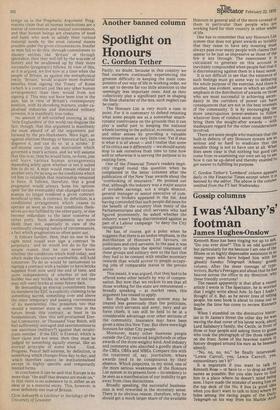Another banned column
Spotlight on Honours
C. Gordon Tether
Partly, no doubt, because in this country we find ourselves continually experiencing the greatest difficulty in keeping the main components of our way of life in working order, we are apt to devote far too little attention to the seemingly less important ones. And as they collectively play a significant part in shaping the final character of the mix, such neglect can be costly.
The Honours List is very much a case in point. For it is customary to defend retaining what some people see as .0. somewhat anachronistic contrivance on the grounds that it can play a useful part in keeping the national wheels turning in the political, economic, social and other senses by providing a valuable incentives system at very little cost. Yet if that is what it is all about — and I realise that some of its critics see it differently — we should surely stop to ask ourselves from time to time how well or otherwise it is serving the purpose in its existing form.
One of the Financial Times's readers implicitly ringed round this question when he complained in the letter columns after the publication of the New Year awards about the "overlooking of insurance." He pointed out that, although the industry was a major source of invisible earnings, not a single director, general manager or senior executive of companies or brokers appeared in the list. And having contended that such people did more for the benefit of the country than many of the Parliamentarians and civil servants who had figured prominently, he asked whether the industry wasn't being discriminated against as part of a Labour campaign "to deny the City recognition."
He has, of course, got a point when he suggests that there is an undue emphasis, in the distribution of Honours List favours, on politicians and civil servants. In the past it was customary to relate the special treatment of these groups and military men to the fact that they had to be content with smaller monetary rewards than would accrue to people occupying jobs of comparable status in the private sector.
This meant, it was argued, that they had to be offered some other benefit by way of compensation. But now that we reckon to see that all those working for the state are remunerated — broadly speaking — at market rates, this argument has ceased to apply. But though the business system may be treated less generously than the politicians, senior civil servants and army, navy and air force chiefs, it can still be held to be at a considerable advantage over other sections of the community. Insurance may have been given a miss this New Year. But there were high honours for other City people.
Moreover, many other business people outside the City received knighthoods or other awards of the more weighty kind. And industry and commerce also absorbed a goodly share of the CBEs, OBEs and MBEs. Compare this with the treatment of, say, journalism, where awards tend to be conspicuous by their absence. Which pinpoints, to my mind, one of the more serious weaknesses of the Honours List system in its present form — its tendency to be seen as a manifestation of our inability to get away from class distinctions.
Broadly speaking, the successful businessman is well rewarded in the monetary sense. There is no obvious reason, therefore, why he should get a much larger share of the available Honours in general and of the more coveted of them in particular than people who are working hard for their country in other walks of life.
One has to remember that any Honours List system that does not grant awards so lavishlY that they cease to have any meaning must always pass over many people with claims that appear to be just as impressive as those of the few it lets through. The resentment it is calculated to generate on this account IS inevitably compounded when people feel that it is discriminating against them in a basic sense. It is not difficult to see that the existence of such feelings must go some way to defeating the whole purpose of the exercise. And there Is another, less evident, sense in which an undue emphasis in the distribution of awards on those who are most successful in achieving ascendancy in the corridors of power can have consequences that are not in the best interests of the community. It is by encouraging the more unscrupulous power-seekers to follow whatever lines of conduct seem most likely.t0 bring them the sought-after awards —
inadequate regard for the other considerations involved.
There are some people who maintain that the built-in defects of any Honours system are so serious and so hard to eradicate that the sensible thing is not to have one at all. What does seem clear is that nothing but good can come from re-examining our own set-up to see how it can be up-dated and thereby enabled to get nearer to fulfilling its purpose.
C. Gordon Tether's 'Lombard' column appears daily in the Financial Times except when it Is banned by the editor. The above is the colurno omitted from the FT last Wednesday


































 Previous page
Previous page